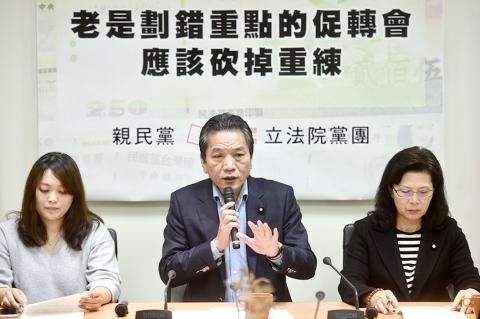The People First Party (PFP) caucus yesterday urged members of the Transitional Justice Commission to resign en masse and threatened to freeze the commission’s budget for next year until the Cabinet-level body is filled with new members.
The commission’s main tasks should be to restore historical truth and clear the names of wrongly convicted people, PFP caucus whip Lee Hung-chun (李鴻鈞) said.
Those were also the answers given by commission Acting Chairwoman Yang Tsui (楊翠) in a questionnaire that the party sent to Yang after her appointment as a commission member in April, Lee said.

Photo: Chien Jung-fong, Taipei Times
“However, now Yang’s priorities are to remove statues of Chiang Kai-shek (蔣介石), change the design of the nation’s currency and abolish military honor guards [at Chiang Kai-shek Memorial Hall in Taipei],” Lee told a news conference in Taipei.
Lee said that the commission members should have held a meeting to discuss Chiang’s achievements and mistakes, and released their conclusions for public review.
“The process of removing statues of Chiang should only begin after the public accepts their conclusions. Skipping the process will make such a process like fruits grown on a poisonous tree. No matter how sweet the fruits are, they are also toxic,” he said.
Transitional justice touches on many issues, including history, laws, politics and cultural values, PFP Legislator Chen Yi-chieh (陳怡潔) said.
In light of the limited time and staff the commission has been given, and as many historical documents are decaying, the commission should make salvaging historical documents its top priority and comforting White Terror victims its second, Chen said.
Even though Cheng Hsin General Hospital, which was established by Chiang’s wife Soong Mayling (蔣宋美齡), was founded with money from questionable sources, it does not make it less of a good hospital, PFP Legislator Chou Chen Hsiu-hsia (周陳秀霞) said.
“We should not ruin the hospital in pursuit of transitional justice,” he said.
“Similarly, 99.9 percent of the shares of Hua Nan Commercial Bank came from assets that were appropriated by the government from Chen Hsin (陳炘), Taiwan’s richest man during the late Japanese colonial era,” Chou Chen said. “Is the government going to destroy the bank just to make sure that justice is served?”
Facilitating reconciliation is transitional justice’s ultimate goal and the commission should steer society toward harmony, instead of sowing conflict and division, while wasting government resources, the caucus said.
The Act on Promoting Transitional Justice (促進轉型正義條例) stipulates that the commission should consist of nine members, including a chairperson and a vice chairperson, with the number from any single political party capped at three.
The members should be nominated by the premier and approved by the legislature. Their tenure is not to expire until after the commission completes its initial task of compiling a detailed investigative report, a plan of action and draft legislation, which it is to do within two years, before being dissolved.
Meanwhile, a transitional justice repeal bill proposed by Chinese Nationalist Party (KMT) Legislator Lai Shyh-bao (賴士葆), which was scheduled to be reviewed at a plenary legislative session yesterday, has been returned to the Legislative Yuan’s Procedure Committee after the Democratic Progressive Party and New Power Party caucuses submitted objections.
Lai said he would refile the bill every week.
Additional reporting by Chen Yun

Chinese Nationalist Party (KMT) Chairman Eric Chu (朱立倫), spokeswoman Yang Chih-yu (楊智伃) and Legislator Hsieh Lung-chieh (謝龍介) would be summoned by police for questioning for leading an illegal assembly on Thursday evening last week, Minister of the Interior Liu Shyh-fang (劉世芳) said today. The three KMT officials led an assembly outside the Taipei City Prosecutors’ Office, a restricted area where public assembly is not allowed, protesting the questioning of several KMT staff and searches of KMT headquarters and offices in a recall petition forgery case. Chu, Yang and Hsieh are all suspected of contravening the Assembly and Parade Act (集會遊行法) by holding

PRAISE: Japanese visitor Takashi Kubota said the Taiwanese temple architecture images showcased in the AI Art Gallery were the most impressive displays he saw Taiwan does not have an official pavilion at the World Expo in Osaka, Japan, because of its diplomatic predicament, but the government-backed Tech World pavilion is drawing interest with its unique recreations of works by Taiwanese artists. The pavilion features an artificial intelligence (AI)-based art gallery showcasing works of famous Taiwanese artists from the Japanese colonial period using innovative technologies. Among its main simulated displays are Eastern gouache paintings by Chen Chin (陳進), Lin Yu-shan (林玉山) and Kuo Hsueh-hu (郭雪湖), who were the three young Taiwanese painters selected for the East Asian Painting exhibition in 1927. Gouache is a water-based

Taiwan would welcome the return of Honduras as a diplomatic ally if its next president decides to make such a move, Minister of Foreign Affairs Lin Chia-lung (林佳龍) said yesterday. “Of course, we would welcome Honduras if they want to restore diplomatic ties with Taiwan after their elections,” Lin said at a meeting of the legislature’s Foreign Affairs and National Defense Committee, when asked to comment on statements made by two of the three Honduran presidential candidates during the presidential campaign in the Central American country. Taiwan is paying close attention to the region as a whole in the wake of a

OFF-TARGET: More than 30,000 participants were expected to take part in the Games next month, but only 6,550 foreign and 19,400 Taiwanese athletes have registered Taipei city councilors yesterday blasted the organizers of next month’s World Masters Games over sudden timetable and venue changes, which they said have caused thousands of participants to back out of the international sporting event, among other organizational issues. They also cited visa delays and political interference by China as reasons many foreign athletes are requesting refunds for the event, to be held from May 17 to 30. Jointly organized by the Taipei and New Taipei City governments, the games have been rocked by numerous controversies since preparations began in 2020. Taipei City Councilor Lin Yen-feng (林延鳳) said yesterday that new measures by